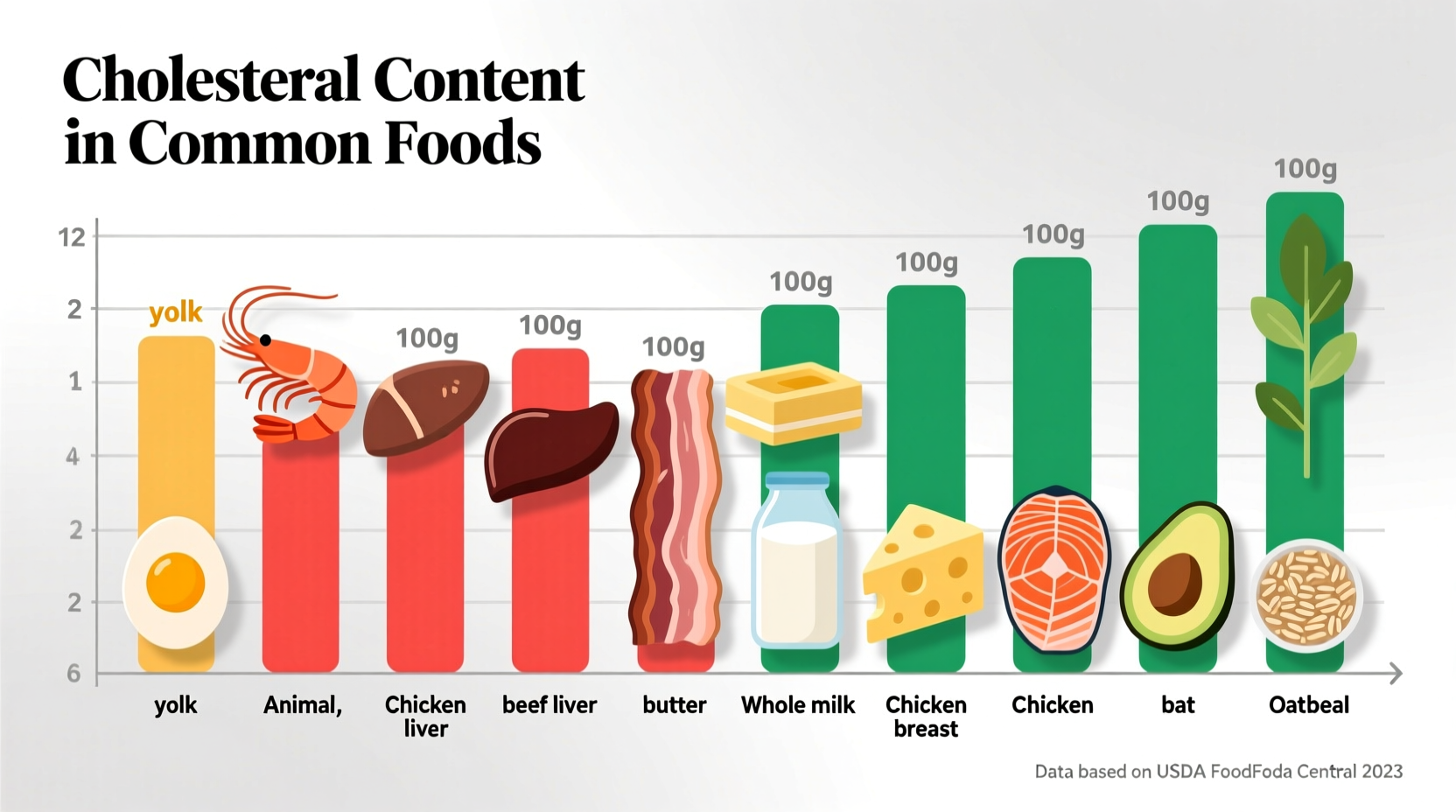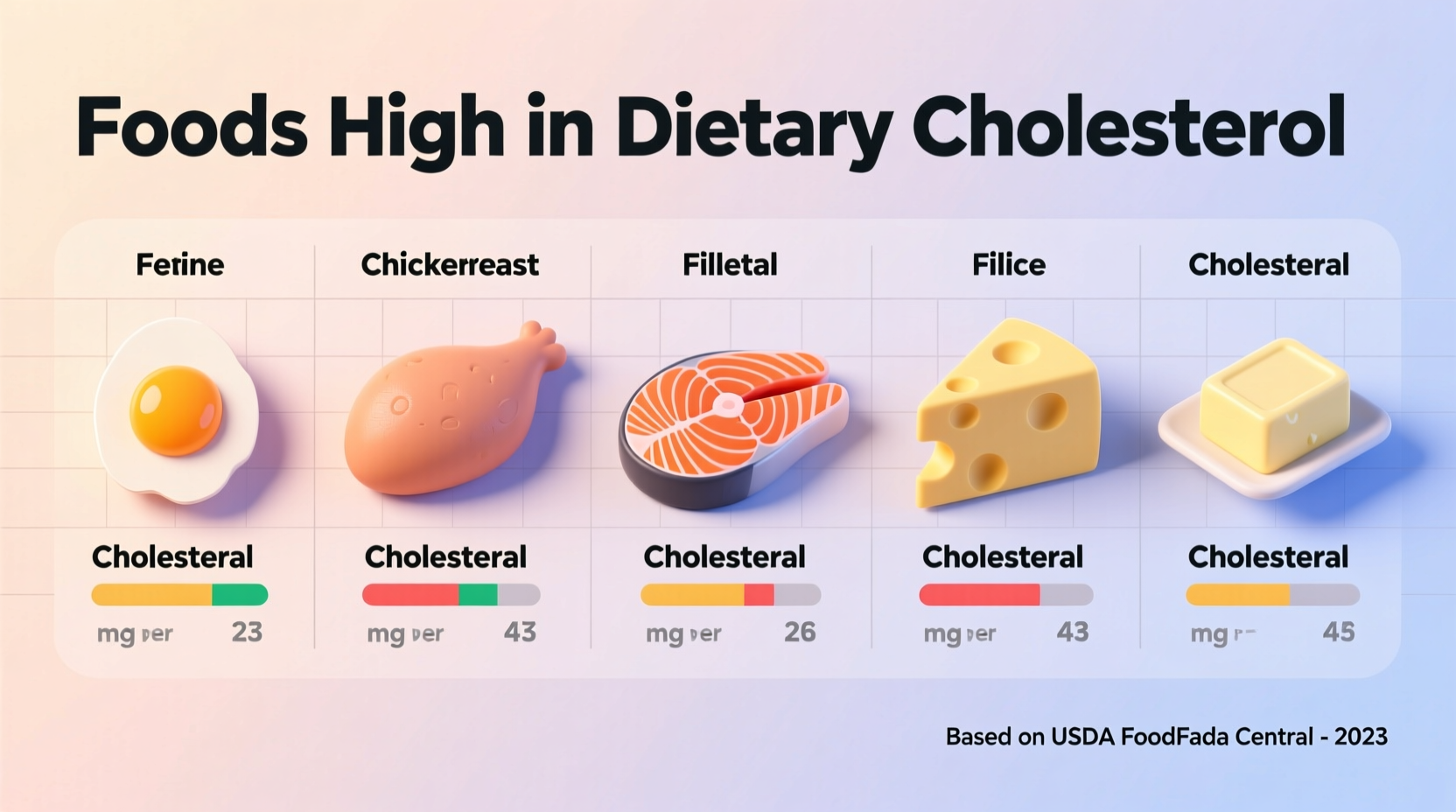Understanding which foods contain cholesterol is essential for making informed dietary choices, especially if you're monitoring your heart health. This guide provides science-backed information about dietary cholesterol sources and their actual impact on your body.
What Exactly Is Dietary Cholesterol?
Cholesterol is a waxy substance your body needs to build cells and produce certain hormones. Your liver naturally produces all the cholesterol your body requires. Dietary cholesterol comes exclusively from animal-based foods, as plants don't produce cholesterol.
For decades, health organizations recommended limiting dietary cholesterol to 300mg daily. However, recent research has shifted this understanding. The National Heart, Lung, and Blood Institute now emphasizes that saturated and trans fats affect blood cholesterol levels more significantly than dietary cholesterol for most people.
Foods That Naturally Contain Cholesterol
Only animal-derived products contain dietary cholesterol. Here's a breakdown of common sources:
Eggs and Egg Products
A single large egg contains about 186mg of cholesterol, primarily in the yolk. Despite this, numerous studies show eggs have minimal impact on blood cholesterol for most healthy individuals. The American Heart Association states that one whole egg or two egg whites daily can be part of a healthy diet.
Shellfish
Surprisingly high in cholesterol but low in saturated fat:
- Shrimp: 179mg per 3-ounce serving
- Lobster: 72mg per 3-ounce serving
- Scallops: 35mg per 3-ounce serving
Organ Meats
These nutrient-dense foods contain the highest cholesterol levels:
- Liver (beef): 331mg per 3-ounce serving
- Brain: Extremely high (typically 2,000+ mg per serving)
- Kidney: 350mg per 3-ounce serving
| Food (3-ounce serving) | Cholesterol (mg) | Saturated Fat (g) |
|---|---|---|
| Egg (1 large) | 186 | 1.6 |
| Shrimp | 179 | 0.3 |
| Beef liver | 331 | 2.2 |
| Chicken (skinless) | 85 | 0.9 |
| Salmon | 52 | 1.9 |
| Whole milk (1 cup) | 33 | 4.6 |
The Evolution of Cholesterol Understanding
Scientific understanding of dietary cholesterol has evolved significantly over time:
- 1960s-1980s: Researchers established the link between high blood cholesterol and heart disease risk
- 1990s: Dietary guidelines began recommending cholesterol restriction to 300mg daily
- 2013-2015: The American Heart Association stopped recommending specific cholesterol limits, focusing instead on overall dietary patterns
- 2020-Present: Current guidelines emphasize saturated fat reduction over dietary cholesterol restriction for most people
This shift occurred because research revealed that for approximately 70% of the population, dietary cholesterol has minimal impact on blood cholesterol levels. Only "hyper-responders" (about 30% of people) experience significant blood cholesterol increases from dietary cholesterol.
Plant-Based Foods: Naturally Cholesterol-Free
All plant-derived foods contain zero cholesterol. This includes:
- Fruits and vegetables
- Grains and cereals
- Nuts and seeds
- Legumes (beans, lentils, peas)
- Plant oils
Even coconut oil and palm oil, which are high in saturated fats, contain no dietary cholesterol. The confusion often arises because saturated fats can influence how your body processes cholesterol.

Practical Dietary Guidance
Instead of focusing solely on dietary cholesterol, prioritize these evidence-based strategies:
- Reduce saturated fats: Found in fatty meats, full-fat dairy, butter, and tropical oils
- Eliminate trans fats: Often listed as "partially hydrogenated oils"
- Increase soluble fiber: Oats, beans, lentils, and certain fruits help lower LDL cholesterol
- Choose lean proteins: Fish, skinless poultry, and plant-based proteins
- Include healthy fats: Avocados, nuts, seeds, and olive oil
When Dietary Cholesterol Matters More
Certain health conditions require more careful attention to dietary cholesterol:
- Familial hypercholesterolemia: Genetic condition affecting 1 in 250 people
- Type 2 diabetes: May increase sensitivity to dietary cholesterol
- Existing heart disease: Requires comprehensive cholesterol management
- Hyper-responders: Individuals whose blood cholesterol rises significantly with dietary intake
If you have any of these conditions, consult with a healthcare provider or registered dietitian for personalized guidance. For most healthy individuals, moderate consumption of cholesterol-containing foods like eggs can be part of a balanced diet.
Common Misconceptions Clarified
Myth: All high-cholesterol foods are unhealthy
Fact: Many high-cholesterol foods like eggs and shellfish are nutrient-dense and can be part of a healthy diet.
Myth: Dietary cholesterol directly translates to higher blood cholesterol
Fact: For most people, saturated and trans fats have a much greater impact on blood cholesterol levels than dietary cholesterol.
Myth: Plant-based "cholesterol-free" labels indicate special processing
Fact: All plant foods naturally contain zero cholesterol—these labels simply state an inherent property.











 浙公网安备
33010002000092号
浙公网安备
33010002000092号 浙B2-20120091-4
浙B2-20120091-4